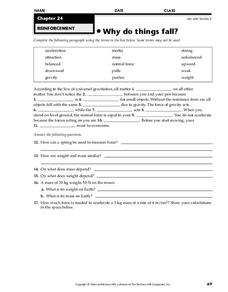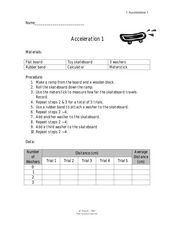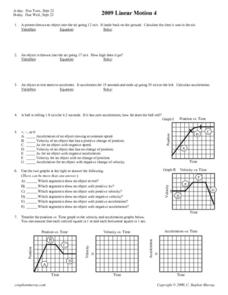Curated OER
Why Do Things Fall?
In this universal gravitation learning exercise, students fill in the blanks to complete sentences with 11 given terms about gravity, inertia, acceleration, mass and force. Students also answer 7 questions about mass, weight and force.
Curated OER
Forces
In this forces worksheet, students read about what affects the force on an object. Students identify push forces and pull forces in 5 diagrams. They answer 13 questions about the forces in two diagrams and they draw vector diagrams to...
Curated OER
Graphing of Time and Distance
In this graphing time and distance worksheet, students graph data of a two race cars as they drive over time. Students plot the time vs. the distance for both cars and answer questions about the data. They determine the speed of the cars...
Curated OER
Comparing Distance/Time Graphs to Speed/Time Graphs
In this graphing the motion of objects worksheet, students compare graphs of distance vs. time and speed vs. time of objects moving at constant speed, accelerating, slowing down, and stopped. Students identify the movement of a car given...
Curated OER
Acceleration 2
In this acceleration worksheet, students experiment with varying amounts of mass to observe the effects on the force needed to move an object. Students apply Newton's Second Law of Motion to describe the relationship between mass and...
Curated OER
Acceleration 1
In this acceleration worksheet, young scholars use weights to increase the mass affecting the force on moving objects. Students plot a graph of their data and answer 3 questions about how the acceleration of the toy skateboard used in...
Curated OER
Roller Coaster Physics
Young scholars design a roller coaster that allows a marble to run the course as fast as possible. Students create an experimental roller coaster taking into account the steepness of the hills and the sharpness of the turns. Young...
Curated OER
Force and Acceleration
In this force and acceleration learning exercise, students solve 3 problems about moving objects, the forces working against them, the mass and their acceleration. Students determine if 6 statements about a falling elephant and a falling...
Curated OER
Motion Crossword Puzzle
In this motion worksheet, students complete a crossword puzzle given 11 clues related to rate, acceleration, force of gravity and velocity. They also complete a puzzle where they unscramble 11 words related to motion to solve for a final...
Curated OER
Newton's Laws Review
In this Newton's Laws worksheet, students solve 4 problems using Newton's Laws. Students explain their work and calculations using Newton's Laws and equations.
Curated OER
Speed and Acceleration
In this speed and acceleration worksheet, high schoolers solve 4 problems where they find the average velocity of a moving object, the acceleration of a moving object, the distance a moving object travels and the time a falling object...
Curated OER
Force & Acceleration
Young scholars investigate the effects of weights on the motion of a toy car. In this force and acceleration lesson plan, students use different weights, a toy car, a paper clip and string to determine how a car will move as different...
Curated OER
Linear Motion 3
In this linear motion worksheet, students answer 11 questions including finding acceleration of moving objects, finding the distance objects travel and finding the time it takes objects to move a particular distance. Students interpret...
Curated OER
Linear Motion 4
In this linear motion learning exercise, high schoolers answer 12 questions including finding acceleration of moving objects, calculating distance objects travel and determining the time of travel. Students interpret graphs of position...
Curated OER
Linear Motion in Class Test Review
In this linear motion worksheet, students answer 21 questions about acceleration, velocity, position and time. Students interpret graphs of position vs. time, velocity vs. time and acceleration vs. time. They calculate speed of objects,...
Curated OER
Acceleration
In this acceleration worksheet, high schoolers solve 14 problems including finding work done on an object, the speed of an object, the distance traveled and the acceleration.
Curated OER
Graphing Linear Motion
In this graphing linear motion worksheet, students answer 20 questions about velocity of objects, the distance they travel and the time. They interpret a graph of position vs. time and identify the velocity at certain point on the graph.
Curated OER
Linear Motion 2
In this linear motion worksheet, high schoolers answer 12 questions about displacement, velocity, and acceleration. They solve problems for acceleration, displacement and velocity and show the equations they used to find the solutions....
Curated OER
Linear Motion 6
In this linear motion worksheet, students answer 12 questions about acceleration, velocity and distance traveled. They interpret diagrams and indicate the location of an object if it has positive, negative or no acceleration. They...
Curated OER
Linear Motion 5
In this linear motion worksheet, students answer 9 questions about velocity, acceleration and position of objects. They solve problems for acceleration and velocity and they interpret graphs of velocity vs. time, acceleration vs. time...
Curated OER
Newton's Second Law
In this Newton's Second Law worksheet, students answer 13 questions about force, mass and acceleration. They calculate weight, force, masses and acceleration of objects.
Curated OER
Velocity
In this velocity activity, students solve 13 problems including finding acceleration of objects, forces on objects, velocity of objects and interpreting graphs of position vs. time.
Curated OER
Some Acceleration Practice Problems
In this acceleration worksheet, high schoolers practice determining acceleration, distance traveled, velocity and time given 5 problems with different scenarios.
Curated OER
Acceleration and Average Speed
In this acceleration and average speed activity, students learn the equations for acceleration and average speed. They match 6 variables with their quantities, they identify speed vs. velocity and scalar vs. vector and they solve 4...

























